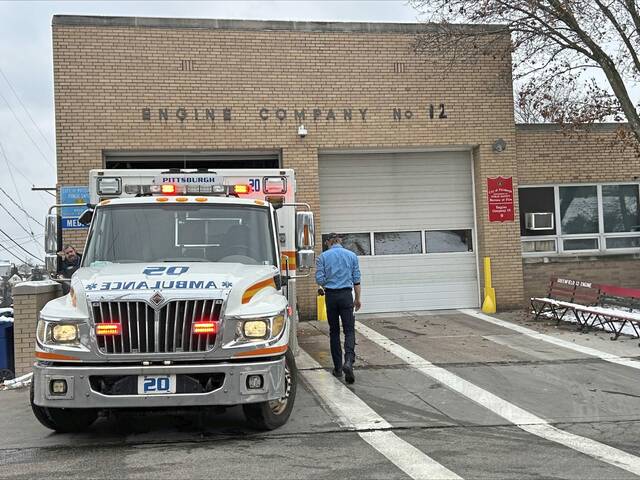Public transit isn’t just about getting from point A to point B. It’s a platform for opportunity, connection and growth — and can be the foundation for the kind of future Pittsburgh says it wants.
For decades, our region has worked to reverse population decline and position itself for long-term, inclusive growth. From a peak of nearly 677,000 residents in 1950, the city’s population now sits just above 300,000. Allegheny County has held steady around 1.2 million, even as other regions have gained people, jobs and momentum.
But Pittsburgh has the assets to grow: a world-class health care system, top-tier universities, rich cultural life, championship sports, relatively affordable housing and some of the best natural beauty of any U.S. city. What we need is the infrastructure to match — and public transit is central to that equation.
Transit connects people to jobs, education, health care, child care and each other. It makes cities more livable, equitable and economically competitive. And increasingly, it’s what workers want.
A 2022 national survey found that 77% of millennials and 64% of Gen Z respondents consider access to public transit a major factor when deciding where to live and work. These are the largest, most mobile generations in the economy. Cities that invest in connected, convenient transit stand a much better chance of attracting and retaining talent.
That’s especially true for regions like ours looking to grow new industries. Today, Pittsburgh leaders are placing a big bet on artificial intelligence to drive the next wave of economic transformation. With our research universities, growing startup ecosystem and low-cost energy, Pittsburgh is well-positioned to lead.
But without strong public transit, we risk becoming a launch pad, not a landing pad.
Already, too many tech startups that began here have relocated elsewhere to scale up. Companies cite talent recruitment, mobility and quality of life as key factors. One Pittsburgh-based AI firm recently moved back into the city after struggling to hire workers at its suburban facility because employees needed better transit access.
Let’s be clear: we’re not just asking for a handout. We’ve taken real steps to contain costs — reducing our workforce through attrition, right-sizing service in underutilized areas and improving operational efficiency. But even the most efficient transit system can’t outrun a structural funding gap. Cost containment is important, but slashing expenses without regard for service impact is a false economy.
The real issue isn’t just spending — it’s underinvestment. PRT already delivers essential service to hundreds of thousands every day. The solution isn’t to shrink service to fit a shrinking budget, but to secure sustainable, long-term funding that supports a modern, efficient transit system that drives regional growth, access to jobs, and climate resilience.
At Pittsburgh Regional Transit, we’re fighting to protect and strengthen the service that more than 130,000 riders rely on every weekday. But without a long-term solution to Pennsylvania’s transit funding shortfall, we face the prospect of major service cuts that would undercut the very economic growth our region is working to achieve. We’ve sounded the alarm in Harrisburg, collaborated with elected officials, and made clear what’s at stake: Pittsburgh cannot compete in the modern economy without robust, reliable public transit.
We’ve also worked closely with communities across Allegheny County to develop a forward-looking, achievable vision for what transit should be. Through the NEXTransit long-range plan and the Bus Line Redesign, thousands of residents helped shape a system built for the future: faster connections to Oakland, new rapid transit corridors, better access to the airport, and expanded coverage in growing communities. These plans also include modernizing maintenance infrastructure and delivering frequent, reliable service during evenings and weekends.
Gov. Josh Shapiro’s proposed $292 million increase in statewide transit funding is a meaningful step forward. If passed, PRT would receive approximately $40 million. But even then, it won’t be enough to prevent major service reductions. The funding shortfall is simply too deep. Without a long-term solution, PRT may still need to cut service and raise fares — outcomes that would harm the very people and communities public transit is meant to support.
Transit cuts aren’t just an inconvenience. They’re a warning sign to the people and businesses we’re trying to attract. They signal that Pittsburgh isn’t serious about building a 21st-century economy. They threaten our ability to grow, retain startups spun out of CMU and Pitt, and welcome new residents from across the country and the world.
Other regions aren’t standing still. Seattle prioritized light rail and bus rapid transit and saw 23% population growth between 2010 and 2020. Pittsburgh grew by less than 1%. Growth is not an accident; it’s the result of sustained, intentional investment.
With the right tools, Pittsburgh can offer something special: the economic opportunity of a major metro, the affordability and quality of life of a midsized city, and the infrastructure to support it all.
The return on investment is real. Every $1 invested in public transportation generates $4 through job creation, higher property values, and improved access to employment. And for nearly 200,000 people in southwestern Pennsylvania who live in households without a car, transit isn’t optional. It’s essential.
Reliable transit benefits the entire region, not just the city. It means fewer cars on suburban roads, stronger connections to airport jobs, and more access to opportunity in communities across western Pennsylvania.
This is a moment of decision. We know what needs to be done. We’ve built the plans. We have the vision. Now we need the will to act.
Let’s stop asking Pittsburghers to settle for less. Let’s deliver the transit system our region needs and deserves.
Katharine Kelleman is the chief executive officer of Pittsburgh Regional Transit.








